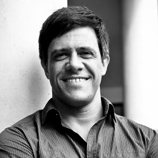See the series intro here.
 Today’s interview is with Constantine Campbell (who you hear playing tenor sax, video below), senior lecturer in New Testament and Greek at Moore Theological College, Sydney. He holds a doctorate in Ancient History, and is an Honorary Associate of the Department of Ancient History, Macquarie University, Sydney. He is a public speaker, musician, and author, and lives in Sydney with his wife and three children.
Today’s interview is with Constantine Campbell (who you hear playing tenor sax, video below), senior lecturer in New Testament and Greek at Moore Theological College, Sydney. He holds a doctorate in Ancient History, and is an Honorary Associate of the Department of Ancient History, Macquarie University, Sydney. He is a public speaker, musician, and author, and lives in Sydney with his wife and three children.
I first became acquainted with his work in an advanced Greek Grammar PhD seminar in which I read his two monographs on Verbal Aspect published by Peter Lang. He’s also published a primer of sorts on the subject with Zondervan, Basics of Verbal Aspect in Biblical Greek. I recall bumping into Con at the biblioblogger’s dinner in New Orleans a few years ago and shared a short conversation with him. I personally love that he both loves and plays Jazz music in addition to his ministries and publishing. Con, thanks for taking some time to address these important issues!
1. How would you describe the relationship between your “scholarly” endeavors and your involvement in the ministry of the local church?
I regard myself as being in full-time vocational Christian ministry, under the Lordship of Christ, with the purpose of serving his church. For me, all my activities fall somewhere on a spectrum that I would label “Proclaiming Christ and Teaching the Bible.” I would regard teaching Sunday School to primary school children and lecturing at Moore College at different ends of that spectrum, but nevertheless I consider them both part of that job. That means that I do not consider the difference between a pastor and a biblical/theological scholar to be one of a strong disjunction. Those roles simply fall at different places on the spectrum. Both activities are full-time Christian ministry in my view, and both are engaged in teaching the Scriptures. The thing that is different is the level at which the Scriptures are taught. A pastor in a church has a responsibility to teach the Scriptures to “normal,” every day Christians. The biblical scholar has a responsibility to teach the Scriptures to believers who are being equipped to teach others.
I teach full-time at Moore College, but I also preach regularly, am frequently engaged in evangelism, and like to write for scholarly and popular audiences. I simply regard these activities as being all part of the one job, but aimed at different people. Thus, the relationship between scholarly endeavors and ministry in the local church is very tight for me. I could imagine leaving an academic post to become a full time pastor, just as I imagined doing academic work when I was a full time pastor. In my view, the best trainers of pastors will be those who have a pastor’s/preacher’s heart and are actively engaged in, and concerned for, ministry in the local church.
2. What led you to decide on the vocation (of pastor, scholar, or scholar/pastor) you now find yourself in?
As I mentioned above, I could easily consider doing any of those roles. I did not ever intend to train in order to become a scholar, but things led in that direction, mostly through the counsel of others, and an invitation to join the faculty at Moore. My own thinking has been influenced by strategy and gifts. Strategically, I figured there are fewer people who are able to do what I currently do compared to those able to do the pastoral ministry I was doing. And, in fact, I was easily replaced by a very capable guy when I left full time pastoral ministry. Without wanting to sound egotistical, it would be harder to replace me in my current role. Strategy combines with gifts and I realise that while I can do pastoral ministry, my gifts are enhanced in an academic role, while my weaknesses are minimised. In pastoral work, that is probably reversed.
3. How would you describe any sense of “calling” you feel to do what you do?
I believe the New Testament teaches that all Christians are called to belong to the Kingdom of Christ. I don’t believe in any other type of calling, especially not vocational. Of course God can do whatever he wants, and if he chooses to tell someone unambiguously to do this or that, then that’s his business. But I see no reason to expect he will do that in ordinary Christian living. The Scriptures teach us to employ wisdom, use the gifts God has given for his church, and listen to the counsel of others. That’s how I seek to make big decisions.
4. How might the chasm often present between the church and academy be more effectively bridged?
The short answer is that scholars should realise that they are engaged in the ministry of the Word, and that pastors should realise they must be good students of the Scriptures to be good teachers. In other words, scholars need to be pastors and pastors need to be scholars. It’s a spectrum, not two different things. Once we realise that, the chasm will be bridged because there is no chasm.